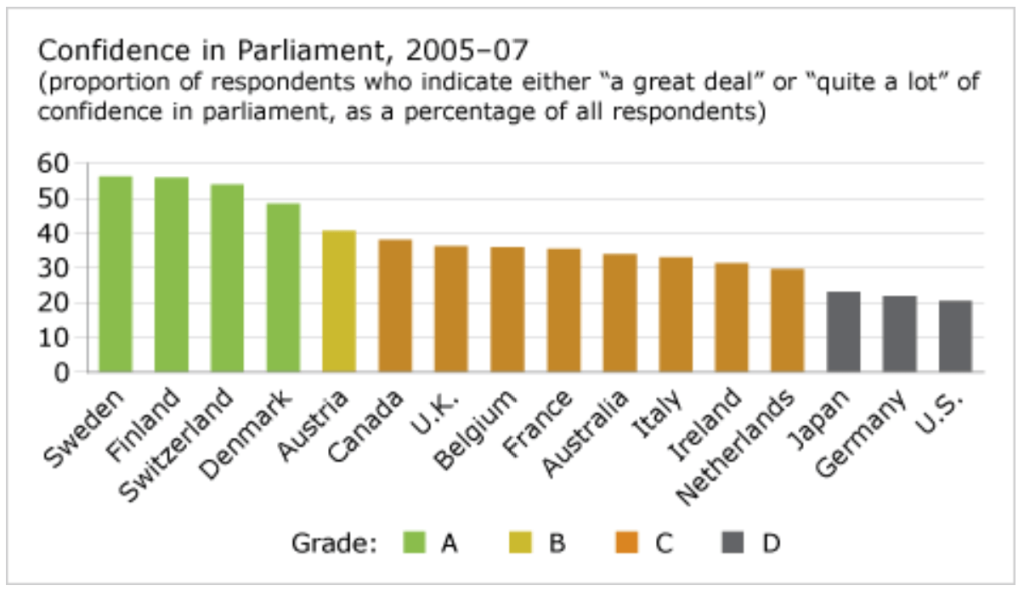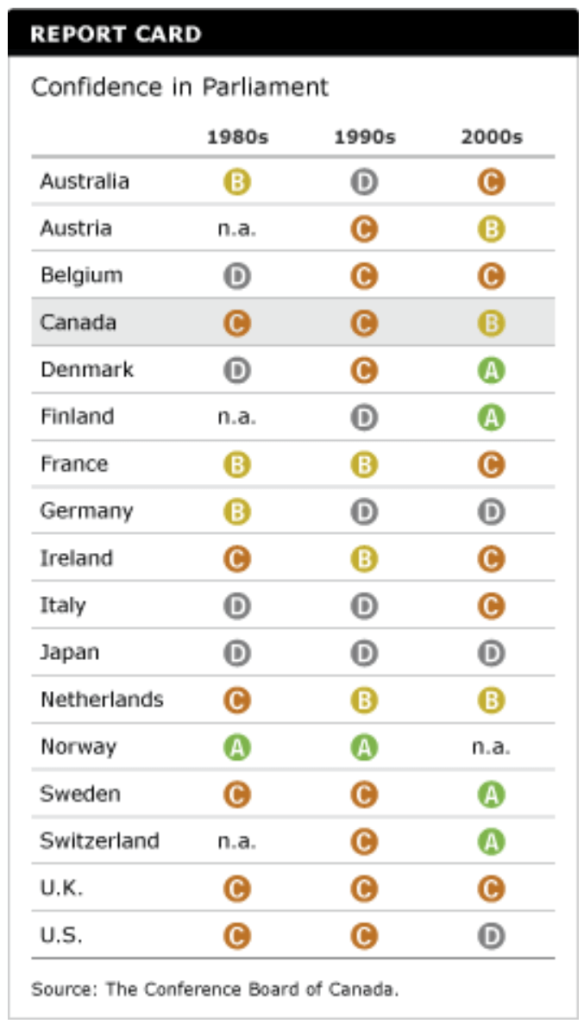Confidence in Parliament
Key Messages
- Canada earns a “C” and ranks 6th among 16 peer countries.
- Public confidence in parliament has declined in most of the peer countries over the last two decades.
- Confidence in political institutions is crucial for the stability of societies and for the functioning of democracy.

Putting confidence in parliament in context
Confidence in political institutions is crucial for the stability of societies and for the functioning of democracy. It also shapes people’s willingness to cooperate in achieving collective goals and financing public goods.1
According to University of Toronto researchers Neil Nevitte and Mebs Kanji, “Occasional citizen dissatisfaction with a particular government is neither unusual nor necessarily problematic.”2 But “more problematical is the possibility that deep and sustained dissatisfaction might corrode regime support. The worry is that dissatisfaction with particular governments might turn into dissatisfaction with the workings of democracy more generally.”3
The confidence in parliament indicator provides a balance to the voter turnout indicator. It offsets the results within the voter turnout indicator that may be reflecting aspects other than social cohesion. In Belgium and Australia, for example, high voter turnout is due to compulsory voting laws, yet both countries report lower-than-average confidence in parliament.
How is confidence in parliament measured?
Confidence in parliament is measured here as the proportion of respondents in each country who answered “a great deal” or “quite a lot” to the following question in the World Values Survey: “Could you tell me how much confidence you have in parliament: is it a great deal of confidence, quite a lot of confidence, not very much confidence, or none at all?”
The World Values Survey is a project based in Stockholm, Sweden, that aims to assess the state of sociocultural, moral, religious, and political values of different countries around the world. There have been five waves of surveys from 1981 to 2007. People in each country are asked the same questions using a detailed questionnaire in face-to-face interviews.
Do Canadians have more confidence in parliament than citizens of other peer countries?
There are extreme variances between peer countries in the level of confidence people have in their parliaments. The highest recent recorded confidence level is in Sweden, with almost 54 per cent of people saying they had “a great deal” or “quite a lot” of confidence in parliament. The lowest recent recorded confidence level is in the U.S., with only 21 per cent responding positively about their parliament. The proportion of Canadian respondents reporting a high level of confidence in parliament is 38 per cent, giving Canada a “C” on this indicator.
Has confidence in parliament declined in Canada and its peer countries?
The World Values Survey shows that public confidence in parliaments has declined in most of the peer countries over the last 20 years. The peer-country average fell from 47 per cent of respondents in the 1980s stating they had “a great deal” or “quite a lot” of confidence in parliament, to 42 per cent in the 1990s, and further to 39 per cent in the 2000s.
Canadians today have less confidence in parliament than they did in the past. The share of respondents reporting a high level of confidence fell from 42 per cent in 1982 to 38 per cent in 2006.
Americans had much less confidence in their government in 2006 than in 1982. In 2006, only 21 per cent of people had a high level of confidence, down from 53 per cent in 1982. This is not really surprising given the unpopularity of George W. Bush at the end of his second term—mainly due to dissatisfaction with the administration’s policies in Iraq. A Washington Post-ABC News poll in May 2006 found that public confidence in the ruling Republican party had plunged to an all-time low: Bush’s job approval rating stood at just 33 per cent.4
How have the grade results changed over time?

While Canada’s relative grade improved to a “B” in the 2000s, it did so only because recent data are not available for Norway. In the 1980s and 1990s, Norway had the highest confidence levels of all peer countries (69 per cent) and was the only country to receive an “A” in those two decades. Norway has not participated in the World Values Survey since 1996, and therefore is not included in the data for the new millennium. In the most recent period, Sweden has the highest level of confidence—56 per cent. Therefore, many of the other peer countries, including Canada, are now closer to the top performer and have a seemingly improved relative grade.
Why is confidence declining?
Many studies have tried to explain the phenomenon of the decline of public trust in government institutions in general. One study attributes lower levels of public trust and rising levels of public dissatisfaction with governments to the following four possible trends:5
- Changes in society’s values—people are more critical of traditional hierarchical institutions.
- Structural changes in the society—increases in educational attainment and skills lead to greater interest and involvement in government and democracy, but also to a more critical approach toward the government.
- Erosion in social capital—the technological transformation of leisure is responsible for declining levels of civic engagement and social trust.
- Lower acceptance of authority—authority patterns have changed in all spheres, including in the family, in the workplace, and in politics.
Footnotes
1 CESifo, “Trust in Political Institutions,” DICE Report 2007, 2 (accessed August 31, 2009).
2 Neil Nevitte and Mebs Kanji, Authority Orientations and Political Support: A Cross-National Analysis of Satisfaction With Governments and Democracy (accessed August 31, 2009).
3 Neil Nevitte and Mebs Kanji, Authority Orientations and Political Support: A Cross-National Analysis of Satisfaction With Governments and Democracy (accessed August 31, 2009).
4 Richard Morin and Dan Balz, “Confidence in GOP Is at New Low in Poll: Democrats Favored To Address Issues,” Washington Post, May 17, 2006 (accessed August 31, 2009).
5 Neil Nevitte and Mebs Kanji, Authority Orientations and Political Support: A Cross-National Analysis of Satisfaction With Governments and Democracy (accessed August 31, 2009).

